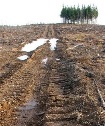Forests and climate
 Deforestation is responsible for around one fifth of global greenhouse emissions.
Deforestation is responsible for around one fifth of global greenhouse emissions.
Forests are like a huge machine that constantly cleans the air. The vegetation of a rainforest absorbs tons of carbon dioxide through photosynthesis and in turn releases oxygen. Each tree produces an average of 20-30 litres per day, and although this is then absorbed in a budget of substantive equality, it is essential to the lives of millions of beings. In contrast, the destruction of forests, especially through fire (to cleanse the soil), burns oxygen and releases carbon into the atmosphere.
Much rainforest clearance in Indonesia is taking place on peatlands. This yields massive additional carbon emissions as the rich organic peat oxidizes or burns. With the loss of rainforest ecosystems we lose one of the planet’s greatest carbon capture and storage systems and best adaptation mechanisms for global warming (up to 300 tons of carbon per hectare).
- Details
 The good news is that over 100 world's leaders recognised it, that without protecting the world's forests, there is no hope to protect the global climate.The bad news is that the Glasgow Declaration is, actually, just a declaration. As environmental in Glasgow organisations pointed out, when a house is burning, firefighters do no waste time with declarations, they just work to extinguish the fire.
The good news is that over 100 world's leaders recognised it, that without protecting the world's forests, there is no hope to protect the global climate.The bad news is that the Glasgow Declaration is, actually, just a declaration. As environmental in Glasgow organisations pointed out, when a house is burning, firefighters do no waste time with declarations, they just work to extinguish the fire.
- Details
 Scientists say the greening effects from rising levels of carbon dioxide might be over. The world is gradually becoming less green, scientists have found. Plant growth is declining all over the planet, and new research links the phenomenon to decreasing moisture in the air—a consequence of climate change. The study published in Science Advances points to satellite observations that revealed expanding vegetation worldwide during much of the 1980s and 1990s. But then, about 20 years ago, the trend stopped. Since then, more than half of the world’s vegetated landscapes have been experiencing a “browning” trend, or decrease in plant growth, according to the authors.
Scientists say the greening effects from rising levels of carbon dioxide might be over. The world is gradually becoming less green, scientists have found. Plant growth is declining all over the planet, and new research links the phenomenon to decreasing moisture in the air—a consequence of climate change. The study published in Science Advances points to satellite observations that revealed expanding vegetation worldwide during much of the 1980s and 1990s. But then, about 20 years ago, the trend stopped. Since then, more than half of the world’s vegetated landscapes have been experiencing a “browning” trend, or decrease in plant growth, according to the authors.
- Details
 Over 120 groups from about 30 different countries have signed the position statement “The Biomass Delusion”, declaring the use of forest biomass for renewable energy to be a false solution for climate change mitigation. The broad NGO coalition, which includes organizations such as Greenpeace, NRDC, BankTrack and the Federation of Community Forest Users in Nepal, calls for an end to all finance, subsidies and policy support for large scale bioenergy.
Over 120 groups from about 30 different countries have signed the position statement “The Biomass Delusion”, declaring the use of forest biomass for renewable energy to be a false solution for climate change mitigation. The broad NGO coalition, which includes organizations such as Greenpeace, NRDC, BankTrack and the Federation of Community Forest Users in Nepal, calls for an end to all finance, subsidies and policy support for large scale bioenergy.
- Details
 A new strategy put forward by fossil fuel corporations to plant trees as ‘compensation’ for climate change is not only a greenwashing gimmick, but a dangerous tactic that could exacerbate the problems caused by fossil fuel exploitation.
A new strategy put forward by fossil fuel corporations to plant trees as ‘compensation’ for climate change is not only a greenwashing gimmick, but a dangerous tactic that could exacerbate the problems caused by fossil fuel exploitation.
- Details
 The CEIBA Biological Centre (CEIBA), in Madewini, Guyana, under its executive director Dr. Godfrey Bourne, is investigating the impact of global warming on tropical ectotherms, namely, butterflies and lizards, whose body temperatures are determined by the environment. They also found that the postman butterfly maintained “relatively stable temperatures during fluctuating” outside temperatures.
The CEIBA Biological Centre (CEIBA), in Madewini, Guyana, under its executive director Dr. Godfrey Bourne, is investigating the impact of global warming on tropical ectotherms, namely, butterflies and lizards, whose body temperatures are determined by the environment. They also found that the postman butterfly maintained “relatively stable temperatures during fluctuating” outside temperatures.



